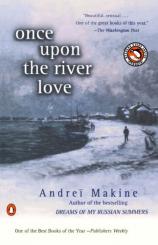Once Upon the River Love
About the Book
Once Upon the River Love
In the remotest reaches of eastern Siberia, three boys dream of a world beyond the ridge of immense, snow-buried forest that surrounds their village. Twenty years later, Dmitri (Mitya) narrates a time in their youth when dreams were as tangible as reality. The three friends grow up in Svetlaya, once a thriving town now reduced by wars and revolution to a mere cluster of izbas. Six miles away, the district center, Kazhdai, the nearest stop of the Transsiberian train, serves as intermittent, fleeting proof to the boys that another world lies west of the pine forest. Twenty miles from their forgotten village, on the banks of the Amur river, sits Nerlug, the only real city the boys have ever known, and home of the Red October Theater, where the boys will soon encounter intoxicating images and sounds imported from the West.
Svetlaya is thousands of miles from Moscow and marked by political and cultural isolation. The gulag on the outskirts of the village and newsreel footage of old generals pinning medals on each other are the only tangible signs of Soviet rule in Svetlaya. The village life that Mitya recalls is also marked by harsh weather. Every winter villagers expect to awaken one morning entombed in their izbas by snow. Human intervention with nature, however, even more powerfully impinges upon the boys' aspirations as they face adulthood: "the life of the village was gradually reduced to three essential matters: timber, gold, and the chill shadow of the camp. It was beyond us to imagine our futures unfolding outside these three prime elements."
Regularly visiting his aunt at her switch operator's station on a desolate section of the Transsiberian railroad, Mitya expectantly awaits the nightly passing of the train, savoring the image of a glamorous Western woman riding in one of its compartments. One night, however, he peremptorily leaves his aunt before the train's appearance and shuffles through the snow to Kazhdai, to a darkened waiting room in the train station, where a red-haired woman comes to wait each day for a passenger who never arrives. Mitya shows her the five rubles in his pocket and accompanies her to a dilapidated izba on the outskirts of town. There he hopes to fuse the fragments of his desire and imagination.
Following a disillusioning night with the "Redhead," Mitya runs into his two friends, who are on an eight-hour trek to the Red October movie theater in Nerlug. The theater, sandwiched between the local office for the Communist militia and the Communard factory for barbed wire, usually shows standard Soviet fare in which a robust tractor driver crows about crop yields to a pretty young revolutionary. On this occasion, however, they view a fantastical French film starring Jean-Paul Belmondo. Belmondo-mania soon breaks out, and neither the city nor the boys' lives will be the same again. A new horizon of possibilities emerges and even time is altered as the showtime of 6:30 begins to adjust the monotony of Soviet existence. Hereafter Mitya will refer to this period as Year One of Belmondo. On subsequent viewings, Mitya comes to understand that Belmondo serves as a different archetype for each of the boys. For Samurai, preoccupied with bolstering his strength ever since a harrowing experience at age ten, Belmondo is the Warrior. For Utkin, who turned to writing after being disfigured by a shifting ice floe at age eleven, he is the Poet. And for the handsome Mitya, the film star is the Lover. Seventeen times during the movie's run the boys return to luxuriate in its glorious silliness, which subverts the ideologically freighted newsreels that precede each showing. Although neither the initial Belmondo movies the boys see nor the ones that follow at the Red October are named in the novel, How to Destroy the Reputation of the Greatest Secret Agent is a likely candidate, and Makine has mentioned The Magnificent One as one of his favorites.
Increasingly convinced that he must choose between staying in the East and fleeing to the West, Mitya returns to the "Redheads"' izba, hoping to gain closure through their sexual encounter. Before reaching her door, however, the sound of her singing a simple song stops him short. He is enchanted: "the more I became impregnated with this secret harmony, the more insignificant my febrile fantasies seemed to me." Mitya leaves, never hearing of her again until Year Two of the new chronology when he learns of her tragic fate. Yet he has learned that "beyond this human clay doomed to disintegration, there is something else! There is that song that arose from the depths of the snow and poured out into the dark-purple April sky."
Soon thereafter Mitya says goodbye to Svetlaya, Asia, and the East, as he heads west to Leningrad to begin film school. Samurai and Utkin feel betrayed, yet both soon follow their respective courses out of the snowbound village; out of the empire altogether. Twenty years later, Mitya reunites with one of them at a Russian bistro in Brighton Beach and learns the fate of the other. The two Russian expatriats recall a "moment of beauty and silence" that happened Once Upon the River Love.
Once Upon the River Love
- Publication Date: August 1, 1999
- Mass Market Paperback: 224 pages
- Publisher: Penguin (Non-Classics)
- ISBN-10: 0140283625
- ISBN-13: 9780140283624








